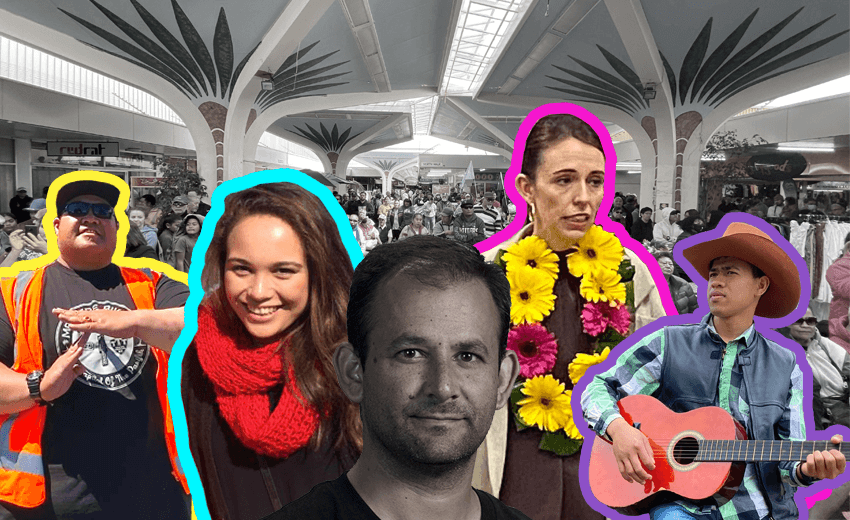When Justin Latif received The Spinoff book for Christmas, he never guessed that six months later he’d be working here. He looks back at his time so far as The Spinoff’s South Auckland editor.
Buying Christmas gifts for one’s partner is always tricky. But last year my wife thought she really cracked it when she bought me a copy of The Spinoff book. Why wouldn’t she? It was a book written by a group of award-winning journalists who were not only upending the traditional approach to New Zealand media but nailing it too. So she probably wasn’t ready when I forced a grin, gave it a quick flick and then suggested we open something else.
Admitting this at the start of a piece on my first six months at The Spinoff seems like career suicide. But that moment explains a lot about why I’m here. For many journalists, there comes a point where you realise you have to leave the media – just as I had done three years earlier. The internet’s impact has meant we often can’t do the kind of work that attracted us to the industry in the first place. Unwrapping that book didn’t inspire me to think about journalism again; it just reminded me that my current job wasn’t as fulfilling or enjoyable as the career I once had.
So when a job ad for a feature writer at The Spinoff popped up, a dear friend suggested I apply. But rather than rehash an old cover letter, I pitched an idea for a dedicated role purely focused on my community of South Auckland. I had seen the region’s main local community newspaper make many of its staff redundant, while the other mainstream newsrooms generally lacked journalists with much lived experience of the region. As I said in my pitch: “South Auckland is one of the most resilient and empowered regions of New Zealand but also a place people face many complex challenges. Due to the impact of Covid-19, South Auckland will be a place of even greater focus, as it often gets hit the worst, but also represents the best of us as a country … given so much attention is already paid to what is happening in South Auckland, it is important for stories to be told from the inside out, rather than just by those looking in.”
I was sure this idea would be rejected, and only pushed send on the email with minutes to spare. But to my surprise, I was invited in for an interview. And instead of needing to justify my pitch, it seemed managing editor Duncan Greive and the crew had already been considering such an approach, and they were even more onboard once we chatted.
The random coincidences leading up to this still blow my mind, but seeing how the last six months has unfolded has also exceeded my expectations.
Within a month of starting, we were back in lockdown and suddenly I was living at ground zero for the latest outbreak. While a nation showed a mix of sympathy and outrage towards South Aucklanders for “letting” coronavirus back, I was sitting in a four-hour line waiting for a Covid test, wondering how I could fairly share the resilience and strength of this region. Over the coming weeks, I had Zoom calls with principals, artists, business people, food bank managers, youth workers and even the prime minister, all with a focus on telling the South Auckland story from an insider’s perspective.
What has added to my surprise has been how much trust people have put in me. Whether it’s been sharing the story of a grandparent dying during lockdown, or a mother’s struggle with her wayward children, or a businessman overcoming his brother’s tragic death, it’s been humbling to have interview subjects put so much faith in me through the sharing of their most intimate and personal tales. And while I know South Auckland’s social-economic statistics make for grim reading, there have been other, less pleasant surprises. One such example is learning that the Counties Manukau District Health Board receives less funding than it requires, as a result of the region’s population being chronically undercounted at successive censuses. I know I’m just scratching the surface on this and many other issues, and I expect my next six to 12 months to be even more revealing.
So what will 2021 bring? For me, it will see my stories carry an extra line next to my picture: “local democracy reporter”. The Local Democracy Reporting programme is funded by NZ on Air, aiming to strengthen coverage of local authorities by putting greater focus on what decisions are made and how those decisions are arrived at. This means I’ll be able to increase my hours from part time to full time, and will allow us to publish even more stories focused on our Pacific communities, as well as open up opportunities for others to write for The Spinoff about South Auckland. And given this is a publicly funded scheme, my stories will be made available to a wide range of media, including on Radio New Zealand.
I am so thankful to Duncan and The Spinoff team for welcoming me into their family and letting me do my thing. And it really is like a family. We have office dogs, quirky weekly staff prizes and a small crop of tomatoes; combine those little things with a group of people who are passionate about telling good stories, and it also feels like home.
And lastly, thank you to the loyal Spinoff members. They’ve funded my role over the last six months, which has meant an ungrateful Christmas gift recipient like myself has been able to write stories about an amazing place like South Auckland.
